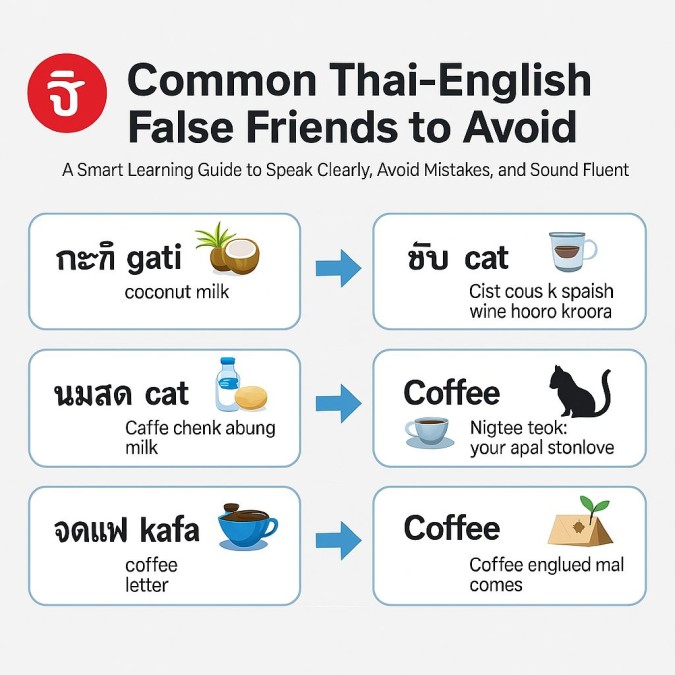🚫 Common Thai-English False Friends to Avoid
A Smart Learning Guide to Speak Clearly, Avoid Mistakes, and Sound Fluent
✨ Section 1: What Are False Friends—and Why They Matter for Thai Learners
Imagine saying “I’m so serious about my new boyfriend” when you mean “I’m excited.” Or telling your teacher “I will present my gift” when you mean “I will give my presentation.” These aren’t just grammar mistakes—they’re false friends.
🧠 What Are False Friends?
False friends are words that look or sound similar in two languages—but have different meanings. For Thai learners of English, false friends often come from:
- Direct translation from Thai to English
- Loanwords that have changed meaning in Thai
- English words used differently in Thai pop culture or media
These words can lead to confusion, miscommunication, or even embarrassment—especially in formal settings like school, interviews, or international chats.
🔍 Why Thai Learners Struggle with False Friends
- English words used in Thai with new meanings
Example: “Gift” in Thai often means “presentation”, not “present”. - Similar pronunciation, different meaning
Example: “Chef” sounds like “chief” but means something else entirely. - Overconfidence from familiarity
Learners assume they know the word because it’s used in Thai—but the English meaning is different.
Smart Learning helps you spot and avoid these traps by teaching vocabulary in context, with bilingual examples and real-life usage.
🚀 Section 2: Top 20 Thai-English False Friends You Should Avoid
Here’s a curated list of the most common false friends, with Thai usage, correct English meaning, and examples.
1. Gift
- Thai meaning: Presentation
- English meaning: A present or something given
- ✅ Correct: “I gave her a gift for her birthday.”
- ❌ Incorrect: “I will do my gift in class.” → should be “presentation”
2. Chef
- Thai meaning: Boss or leader
- English meaning: A professional cook
- ✅ Correct: “He’s a chef at a five-star hotel.”
- ❌ Incorrect: “My chef told me to finish the report.” → should be “boss” or “manager”
3. Present
- Thai meaning: Gift
- English meaning: To show or introduce something
- ✅ Correct: “I will present my project tomorrow.”
- ❌ Incorrect: “I gave her a present in class.” → okay, but context matters
4. Service
- Thai meaning: Hospitality or customer care
- English meaning: General help or function
- ✅ Correct: “The hotel offers great service.”
- ❌ Incorrect: “She has good service.” → should be “She is helpful” or “She’s polite”
5. Sympathy
- Thai meaning: Kindness or friendliness
- English meaning: Feeling sorry for someone
- ✅ Correct: “I have sympathy for his loss.”
- ❌ Incorrect: “She has sympathy with customers.” → should be “She’s friendly”
6. Intelligent
- Thai meaning: Smart or clever
- English meaning: High mental ability
- ✅ Correct: “He’s an intelligent student.”
- ❌ Incorrect: “She’s intelligent with fashion.” → should be “She has good taste”
7. Clinic
- Thai meaning: Beauty or skincare center
- English meaning: Medical facility
- ✅ Correct: “I went to the clinic for a check-up.”
- ❌ Incorrect: “I got my facial at the clinic.” → should be “beauty center”
8. Coach
- Thai meaning: Tutor or mentor
- English meaning: Sports trainer or life coach
- ✅ Correct: “He’s my English coach.”
- ❌ Incorrect: “She’s a coach for math.” → okay, but “tutor” is clearer
9. Copy
- Thai meaning: Photocopy
- English meaning: Duplicate or imitate
- ✅ Correct: “I made a copy of the document.”
- ❌ Incorrect: “I will go copy.” → should be “I will make a photocopy”
10. Office
- Thai meaning: Workplace
- English meaning: Physical location or department
- ✅ Correct: “I work at the office.”
- ❌ Incorrect: “She is office.” → should be “She works in an office”
11. Engineer
- Thai meaning: Technician or repair person
- English meaning: Someone who designs or builds systems
- ✅ Correct: “He’s a software engineer.”
- ❌ Incorrect: “Call the engineer to fix the air.” → should be “technician”
12. Event
- Thai meaning: Marketing or promotional activity
- English meaning: Any planned occasion
- ✅ Correct: “The concert is a big event.”
- ❌ Incorrect: “I work in event.” → should be “I work in event planning”
13. Trainer
- Thai meaning: Fitness instructor
- English meaning: Someone who teaches or coaches
- ✅ Correct: “My trainer helps me at the gym.”
- ❌ Incorrect: “She’s a trainer for English.” → okay, but “teacher” is clearer
14. Brand
- Thai meaning: Company or product name
- English meaning: Trademark or identity
- ✅ Correct: “Nike is a famous brand.”
- ❌ Incorrect: “I work in brand.” → should be “I work in branding”
15. Model
- Thai meaning: Fashion model
- English meaning: Also means example or prototype
- ✅ Correct: “She’s a fashion model.”
- ❌ Incorrect: “Use this model for your essay.” → okay, but context matters
16. Promotion
- Thai meaning: Discount or sale
- English meaning: Advancement or marketing
- ✅ Correct: “I got a promotion at work.”
- ❌ Incorrect: “This is a good promotion.” → should be “discount” or “deal”
17. Manager
- Thai meaning: Boss
- English meaning: Person who manages a team or department
- ✅ Correct: “She’s the marketing manager.”
- ❌ Incorrect: “He is my manager in school.” → should be “teacher” or “advisor”
18. Contact
- Thai meaning: Phone number or person
- English meaning: To communicate
- ✅ Correct: “You can contact me by email.”
- ❌ Incorrect: “He is my contact.” → okay, but “He’s my connection” may be clearer
19. Standard
- Thai meaning: High quality
- English meaning: Normal or expected level
- ✅ Correct: “This is the industry standard.”
- ❌ Incorrect: “She is standard.” → should be “She’s high quality” or “She’s excellent”
20. Drama
- Thai meaning: Gossip or conflict
- English meaning: A type of story or performance
- ✅ Correct: “I love watching Korean drama.”
- ❌ Incorrect: “There’s drama in the classroom.” → okay, but “conflict” is clearer
📝 Practice Challenge
Write a short paragraph using 5 of these words correctly. Example:
“I gave my friend a gift for her birthday. Later, I presented my project in class. My coach helped me prepare, and my manager gave me great feedback. It was a great opportunity.”
🌟 Section 3: How to Avoid False Friends and Speak Naturally
Knowing the list is helpful—but avoiding false friends in real life takes awareness and practice.
🔹 Tip 1: Learn Words in Context
Smart Learning teaches vocabulary with full sentences, not just definitions. You’ll see how native speakers use each word.
🔹 Tip 2: Compare Thai and English Usage
Use bilingual examples to spot differences. Smart Learning shows both sides so you don’t get tricked.
🔹 Tip 3: Practice Speaking
Use Smart Learning’s voice input to say sentences aloud. Get feedback on fluency and clarity.
🔹 Tip 4: Ask for Feedback
Practice with friends or teachers. Ask: “Does this sound natural?” You’ll learn faster.
🔹 Tip 5: Build a False Friend Notebook
Keep a list of words that confuse you. Write the Thai meaning, the correct English meaning, and example sentences.
🔹 Tip 6: Watch Native Content
Watch English shows, YouTube videos, and movies with subtitles. Pay attention to how native speakers use the “false friend” words in real conversations. Notice the tone, context, and collocations (words that often appear together). This will help you internalize the correct meaning.
🔹 Tip 7: Use a Bilingual Dictionary Wisely
When you look up a word, check both the Thai and English definitions. A good dictionary will show example sentences in both languages, so you can compare usage and avoid assuming the meanings are identical.
🔹 Tip 8: Practice with Real-Life Scenarios
Role‑play situations where false friends might appear—like ordering food, giving a presentation, or chatting with friends online. Practice using the correct English meaning in context.
🔹 Tip 9: Keep a “False Friends” Journal
Every time you encounter a false friend, write it down with:
- The Thai meaning
- The correct English meaning
- Two example sentences (one correct, one incorrect)
Review this list weekly to reinforce your memory.
🔹 Tip 10: Test Yourself Regularly
Smart Learning’s adaptive quizzes can mix false friends into listening, reading, and speaking exercises. This keeps you alert and helps you spot them instantly.
💬 Final Thoughts
False friends are sneaky—they look familiar, but they can trip you up when you least expect it. For Thai learners of English, they’re one of the biggest sources of subtle mistakes. The good news? Once you learn to spot them, they’re easy to avoid.
By studying them in context, comparing Thai and English usage, and practicing regularly, you’ll train your brain to choose the right word automatically. You’ll sound more natural, avoid misunderstandings, and build the kind of confidence that makes people want to keep talking to you.
With Smart Learning, you’re not just memorizing lists—you’re building awareness. You’re learning to think in English, not just translate from Thai. And that’s the real secret to fluency.
So start today: pick 3 false friends from this list, write your own example sentences, and use them in conversation this week. The more you practice, the more “true friends” you’ll have in your English vocabulary.



